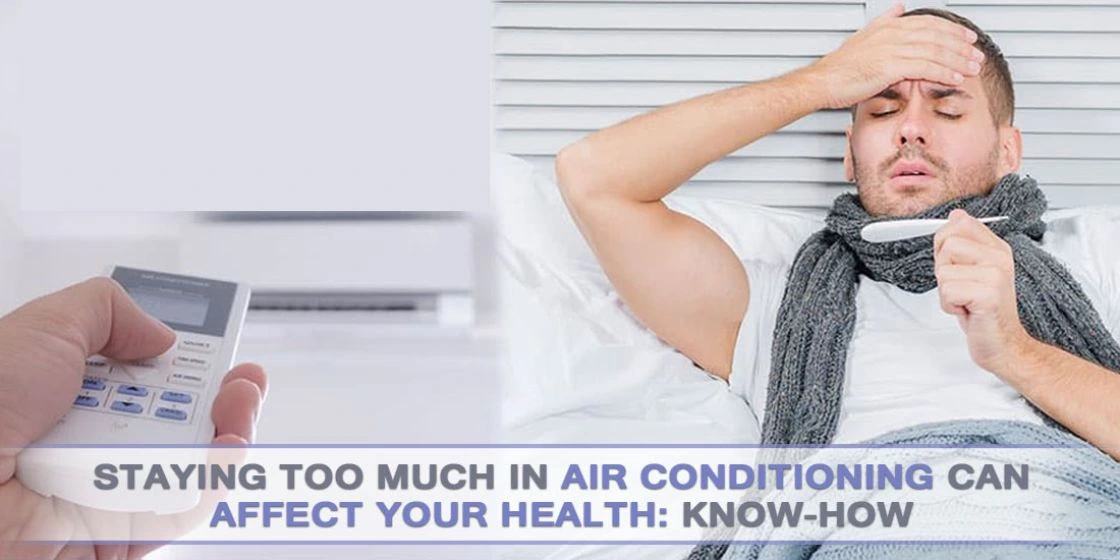Staying Too Much in Air Conditioning Can Affect Your Health
The use of air conditioning in homes and offices has increased dramatically not just because they’re becoming more popular but also the temperature is setting new high records day by day. However, too much air conditioning can affect your health.
When you use air-conditioning equipment in your home, especially if installed in an enclosed room, the room temperature usually gets lower than normal. This also goes for when you’re working in an air-conditioned place. When the temperature becomes too low, it can cause various health problems, such as coughing and breathing.
Effects of Air Conditioners on Your Health:
Air conditioners usually blow air that has been cooled or dehumidified. The air that is cooled should be at around 21 degrees Celsius, but if it’s too cold and you use it for a long time, then you might get the following effects of air conditioners on your health.
01. Dry Eyes:
Dry eyes are an annoying ailment which many people experience. When the temperature of the eyes is too low, it will cause dryness. The cold air from air conditioners will cause the dryness of your eyes, and it can also cause redness and irritation in them, resulting in blurred vision.
02. Dehydration:
If you don’t drink enough water, you’ll gradually become dehydrated. In most cases, dehydration is usually associated with summer seasons because of the hot weather and too much exposure to sunlight. When the body’s temperature becomes too low, because of air-conditioners which have been used for a long time, your thirst sensations will be diminished. Therefore, you won’t feel thirsty even if you’re dehydrated.
03. Lethargy:
When the temperature is too low, you’ll feel sluggish or tired. The body will have to work harder to supply oxygen, so you’ll feel tired. Lethargy is a very common symptom of low temperature. Lethargy also occurs when you’re dehydrated. When your body is dehydrated, you may feel tired. Other reasons can also cause lethargy, but lack of water can also be the culprit.
04. Dry Or Itchy Skin:
Another issue could include dry skin and itchiness. Dehydration is frequently linked to skin dryness, but there are other causes for it as well. A reaction to contaminants in the air of a building is one potential cause.
These may not be obvious and may be brought on by an inadequate cooling system, a lack of regular air replacement, or a build-up of volatile chemicals in the air. This, as well as chemical sensitivity, is frequently blamed for skin conditions that cause itching.
05. Headache:
A low-temperature environment can also cause headaches. When your body is in a cold temperature for a long time, blood vessels in your head constrict, which often leads to headaches.
Air quality is another factor that might contribute to headaches. Filters are necessary for air conditioning systems to maintain a suitable level of air quality. There will be problems with the air quality if these filters are not properly cleaned regularly.
06. Respiratory Issues:
Some people will experience severe respiratory problems when they spend a lot of time in an air-conditioned setting. Air conditioners usually cause this with low air quality. An air conditioner can’t do much to improve the incoming air quality, but it can help filter airborne dust and chemicals if you have a good filtration system installed. Without filtration, you may breathe in contaminants that can cause respiratory difficulties.
07. Infectious Diseases:
Your mucous may dry out due to the irritated mucous membranes and the dry, air-conditioned air. Mucous serves as a barrier that can keep out bacteria and viruses. You might become more exposed as a result.
In addition, a deadly bacterium thrives in large air conditioners and causes Legionnaires’ disease. It has been responsible for many fatalities in many cities, including Melbourne, where huge air conditioning units are used to cool buildings.
08. Allergies and Asthma:
Allergies and asthma are two of the most common diseases experienced by people who live in air-conditioned buildings. The lining of your nasal passages, throat and lungs are usually coated with a protective layer called mucous. This mucous can dry out from the drying air or constant exposure to pollutants.
If you have these problems, you may reduce their severity by keeping your equipment clean, using good quality filters, ensuring the air temperature is at around 21 degrees Celsius and making sure that you’re not exposed to allergens such as tobacco smoke.
09. Stress And Fatigue:
When you’re in a cool place, your body needs to work harder to regulate your internal temperature. This is because, at a low temperature, there will be less movement of warm-blooded fluids in your body. This can cause stress and fatigue, making you feel tired or sleepy. People who work in an air-conditioned environment may become stressed and tired. It can impair your mental capacity and make you feel sluggish.
10. Loss of Ability To Acclimate To Heat:
Most people feel the effects of hot weather, becoming tired and lethargic when temperatures reach about 35 degrees Celsius. However, when you’re in an air-conditioned environment all the time, your body doesn’t have to acclimatise to the heat, so you lose this natural ability to adjust to temperature changes. If you spend a lot of time in a hot environment, such as working outside in extreme weather conditions, your body will be accustomed to it when you spend time inside.
Conclusion:
In conclusion, it is important to remember that your health is important. To protect this, you need the best air conditioning unit. The air-conditioning systems we use are helping us to keep our homes cool but are slowly causing many adverse side effects. We must keep this in mind and use natural ventilation systems whenever possible. However, if you use an air conditioner inside your apartment or house, ensure it’s operating efficiently and is cleaned regularly.
















Leave a Reply